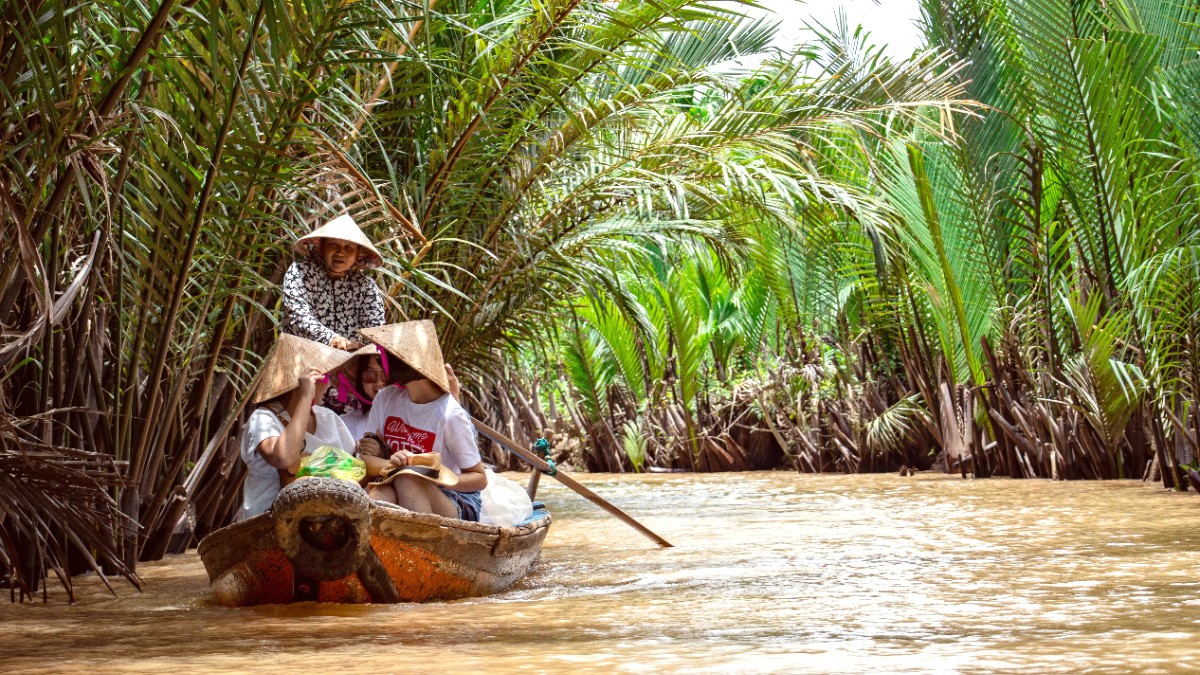
Mekong Delta, Vietnam
Dry Season (December to April): This period brings sunny conditions, lower humidity, and minimal rain. Temperatures typically range from 24°C to 32°C (75°F to 90°F). Many travelers find this the most pleasant time to visit, with comfortable conditions for outdoor activities and boat tours. The air feels crisp, and clear mornings are common, ideal for early floating market visits.
Wet Season (May to November): Higher humidity marks this season, along with frequent afternoon downpours. Temperatures generally range from 26°C to 33°C (79°F to 91°F). Rain is heaviest from July to October. While the rain can be intense, showers often last for only an hour or two, clearing afterward. The landscape turns incredibly lush and green during these months, with fruit orchards thriving.
Can Tho generally does not experience direct hurricane impacts. However, tropical depressions from the South China Sea bring increased rain and stronger winds during the wet season, notably from July to October. Localized flooding is a possibility, especially in low-lying areas and some rural roads, from September to November due to rising Mekong River levels. Monitor local weather forecasts during your visit, especially in the wet season.
(December - February)
Ideal weather, little rain, comfortable temperatures, best for outdoor activities.
Higher prices for accommodation and tours. More crowds. Booking ahead recommended.
(March - April, November)
Pleasant weather (March/April can be hot). Fewer crowds, potentially better prices. November sees decreasing rain.
March/April are the hottest. November still experiences some rain.
(May - October)
Lowest prices for accommodation and tours. Fewer tourists for a relaxed experience.
Frequent heavy rain and high humidity. Localized flooding can occur (Sept-Nov).
Entry into Vietnam calls for attention to visa and passport regulations. Review these details well before your travel. Options include visa exemption for certain nationalities, e-visa for 80 countries (apply via official Vietnam Immigration Department portal), or Visa on Arrival (VOA) requiring an approval letter from a licensed travel agency Before departure. Traditional visas are available from Vietnamese embassies. Always check the current official Vietnamese Immigration Department website for the most up-to-date information and specific exemption periods.
Your passport must be valid for at least six months beyond your planned departure date from Vietnam and have at least two blank pages. Carry the correct visa documentation (e-visa printout, VOA approval letter, or physical visa stamp). Passport photos (4x6 cm) are typically needed for VOA or traditional applications; e-visa requires digital upload. Immigration officials may ask for proof of onward travel or accommodation bookings, so have these accessible. No general entry fees beyond visa costs.
Available for many countries for specific durations.
For citizens of 80 countries, online application, up to 90 days single entry.
Requires pre-obtained approval letter from a licensed agency. IVisa and VisaHQ offer services.
Must be valid for at least 6 months beyond departure.
Standard tourist activities do not need special permits.
Can Tho provides a range of price points, allowing travelers to customize their trip to their budget.
The official currency is the Vietnamese Dong (VND). Exchange rates vary; as of late 2023, 1 USD equals approximately 24,000 VND. Exchange foreign currency at banks, licensed counters, or hotels. ATMs are common in the city center. Major hotels and larger shops accept credit cards, but cash is preferred for smaller purchases, street food, and local markets. Carry small VND denominations.
Tipping is not traditional or mandatory in Vietnam, but it is increasingly appreciated, especially in tourist services. For tour guides and drivers, a tip of VND 50,000 - 100,000 per person per day is common for good service. A small tip (around 10% or rounding up) at restaurants is appreciated, especially in upscale places. For hotel staff, VND 20,000 - 50,000 for porters or housekeepers represents a nice gesture. Street vendors and local eateries generally do not expect tips.
Hostel/Guesthouse: VND 150k-400k/night. Mid-range Hotel: VND 400k-1M/night. Luxury Hotel/Resort: VND 1M-5M+/night. Street Food: VND 25k-80k/dish. Mid-range Restaurant: VND 80k-200k/dish. Upscale Restaurant: VND 200k-500k+/dish.
Prioritize your well-being and security when traveling to Can Tho.
Ensure MMR, Diphtheria-Tetanus-Pertussis, Varicella, Polio, and annual flu shot are current.
Highly recommended due to potential exposure through food or water.
Recommended if you plan to consume street food or eat outside major tourist establishments.
Consult a healthcare professional ideally 4-6 weeks before your trip to discuss your itinerary and personal health.
Japanese Encephalitis: Consider this if spending extensive time in rural or agricultural areas, specifically during monsoon season. Rabies: Recommended for high-risk travelers (e.g., adventure travelers, those working with animals, extended periods in remote areas).
Common Issues: Traveler's Diarrhea (eat thoroughly cooked food, drink Bottled water only). Dengue Fever (Insect repellent, long sleeves/pants). Heatstroke/Dehydration (stay hydrated, light clothing, seek shade).
Sunburn (High-SPF sunscreen, Wide-brimmed hats, Sunglasses). Insect Bites (DEET/Picaridin repellent, Treated mosquito net if needed).
Can Tho General Hospital (public); Hoan My Can Tho Hospital (better facilities, some English-speaking staff).
Widely available, pharmacists assist with minor ailments and OTC medications.
Limited English staff. Consider a Translation app for urgent communication.
Can Tho is generally safe for tourists. Petty theft like bag snatching or pickpocketing can occur in crowded areas. Secure valuables and avoid openly displaying expensive items. Be cautious of overly friendly strangers offering unsolicited help or very cheap tours, as they might lead to overpriced services. Negotiate taxi fares beforehand.
Keep these numbers readily available (phone and physical copy).
113
114
115
Hoan My Can Tho Hospital: +84 292 3917 900 (recommended for foreigners).
Your Embassy/Consulate: Have contact details for your country's embassy or consulate (mostly in Hanoi or Ho Chi Minh City).